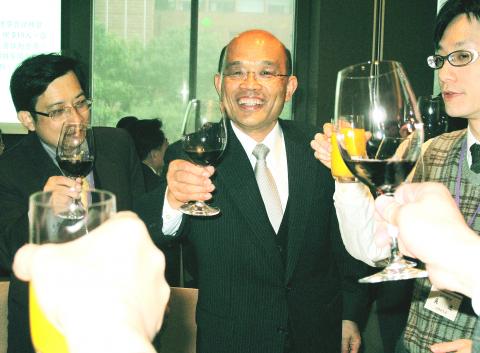Several Democratic Progressive Party (DPP) politicians continued to hint at a possible presidential run over the weekend, with only two months left before party primaries.
In one of his strongest signals yet, former premier Su Tseng-chang (蘇貞昌) said on Saturday he believed a presidential bid would fulfill his ideals, adding that “it is important that ideals are fulfilled every day.”
The 2008 DPP vice presidential nominee denied, however, that he had a timetable for the announcement, contrary to media reports that he could make a declaration on March 6, when his book and video tour ends.

Photo: Lin Shen-hsu, Taipei Times
Su traveled to shore up support in the south yesterday, after joining a local dental association for lunch. On Saturday, he went on a tour with conservation groups to protected wetlands in New Taipei City’s (新北市) Wugu District. Not more than two steps behind him, another former premier, Frank Hsieh (謝長廷), on Thursday said in a TV interview to be aired tonight that he was also “open” to the idea of a presidential bid, but said that DPP Chairperson Tsai Ing-wen (蔡英文) was currently a more popular candidate.
“Tsai’s poll ratings are currently higher,” he told Era TV. “If she doesn’t want to run, then [I’ll] consider it.”
While Tsai has not spoken publicly on her position on a presidential bid, she is understood to also be considering the idea, spurred on by grassroots supporters and senior party officials.
Yesterday she told a DPP event for the Tainan legislative by--elections that she was confident the DPP would “take back power” in the Presidential Office next year, after contending that the DPP has seen a resurgence since 2008, when she took the position of chairperson
The DPP plans to use telephone polls to settle the primaries, a controversial decision that has attracted opposition from many party supporters.

The High Prosecutors’ Office yesterday withdrew an appeal against the acquittal of a former bank manager 22 years after his death, marking Taiwan’s first instance of prosecutors rendering posthumous justice to a wrongfully convicted defendant. Chu Ching-en (諸慶恩) — formerly a manager at the Taipei branch of BNP Paribas — was in 1999 accused by Weng Mao-chung (翁茂鍾), then-president of Chia Her Industrial Co, of forging a request for a fixed deposit of US$10 million by I-Hwa Industrial Co, a subsidiary of Chia Her, which was used as collateral. Chu was ruled not guilty in the first trial, but was found guilty

DEADLOCK: As the commission is unable to forum a quorum to review license renewal applications, the channel operators are not at fault and can air past their license date The National Communications Commission (NCC) yesterday said that the Public Television Service (PTS) and 36 other television and radio broadcasters could continue airing, despite the commission’s inability to meet a quorum to review their license renewal applications. The licenses of PTS and the other channels are set to expire between this month and June. The National Communications Commission Organization Act (國家通訊傳播委員會組織法) stipulates that the commission must meet the mandated quorum of four to hold a valid meeting. The seven-member commission currently has only three commissioners. “We have informed the channel operators of the progress we have made in reviewing their license renewal applications, and

Taiwan People’s Party (TPP) Chairman Huang Kuo-chang (黃國昌) yesterday appealed to the authorities to release former Taipei mayor Ko Wen-je (柯文哲) from pretrial detention amid conflicting reports about his health. The TPP at a news conference on Thursday said that Ko should be released to a hospital for treatment, adding that he has blood in his urine and had spells of pain and nausea followed by vomiting over the past three months. Hsieh Yen-yau (謝炎堯), a retired professor of internal medicine and Ko’s former teacher, said that Ko’s symptoms aligned with gallstones, kidney inflammation and potentially dangerous heart conditions. Ko, charged with

Taiwan-based publisher Li Yanhe (李延賀) has been sentenced to three years in prison, fined 50,000 yuan (US$6,890) in personal assets and deprived political rights for one year for “inciting secession” in China, China's Taiwan Affairs Office spokesman Chen Binhua (陳斌華) said today. The Shanghai First Intermediate People’s Court announced the verdict on Feb. 17, Chen said. The trial was conducted lawfully, and in an open and fair manner, he said, adding that the verdict has since come into legal effect. The defendant reportedly admitted guilt and would appeal within the statutory appeal period, he said, adding that the defendant and his family have